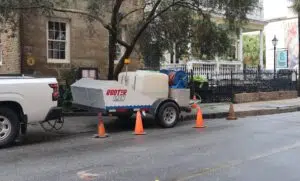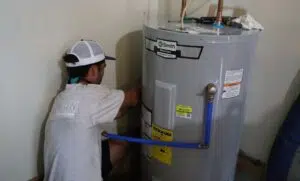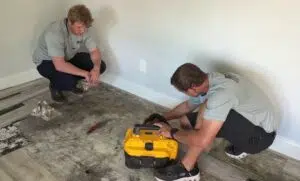The plumbing systems that service our homes and businesses are usually not prominent topics in our minds…That is, until something goes wrong with them. A pipe leak, clog, or other problem with plumbing infrastructure has the ability to practically put life on hold for everyone in the area until it is resolved. In those instances, there is usually a frantic call to an emergency plumber in the area to find out how quickly a technician can be dispatched to the site to resolve the issue.
As is the case with many infrastructure problems, most plumbing emergencies are avoidable–that is, they could have been prevented through inspections, regular maintenance, and replacement of worn parts before there was a serious situation requiring immediate attention.
Weather is one element that has a significant impact on our structures’ plumbing systems, which may be a surprising fact to you. After all, nearly all plumbing is located inside the home or under the ground, where it appears to be well insulated from heat, cold, precipitation, wind-blown debris, and other weather related threats. But there are plenty of negative effects of the weather that you should be aware of, and there are definitely things you can do to protect your home or business from them. Here are our thoughts!
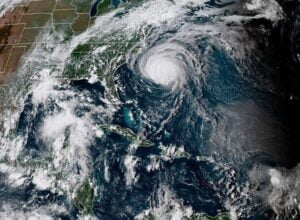
Erosion and Shifting Soil
While our impression of our landscaping may be that it is settled, unmoving, and solid, that is not the case! The natural cycle of the earth includes soil being washed away by water into the rivers and oceans, as well as living things like plants dying and producing new soil to replace it. No one notices this process as it takes place in the wild, but when it happens in our front yard where our plumbing pipes are buried, it tends to cause problems.
Erosion of soil from underneath buried pipes is an extremely common problem that plumbing professionals deal with, as it causes “sagging” of pipes that lose support from below. This leads to cracks and seams between pipes and subsequent water leakage. This problem tends to become far more serious following flooding events due to heavy rains. With the prevalence of hurricanes and tropical storms in the Charleston area, this is a significant risk to be aware of for our customers.
Another erosion related problem is the shifting of tree roots. When a storm and resulting flooding move soil around, they can move tree roots around with the soil or even cause a tree to fall. If those roots collide with plumbing during this type of event, they can damage them or even pull sections of pipe away from each other.
Storm Drain Problems
While most homeowners do not have storm drains on their property that they are responsible for, commercial/industrial properties with parking lots, loading docks, and other large paved areas often do. A storm can create a dangerous situation in these areas if storm drains are not ready for it.
A strong storm that brings down leaves, sticks, and other debris from trees often washes that debris down the storm drains at levels much higher than normal. Following a hurricane, it is common to see parking areas and particularly truck loading docks with standing water long after the rest of the floodwaters have receded. This is usually the result of storm drains being clogged with debris and not allowing water to run off properly. Besides preventing truck loading/unloading activities and blocking parking areas, this problem also threatens mold and mildew growth and foundation damage when standing water is adjacent to the structure itself.
Evidence of storm drain blockage should be reported right away so that a professional plumbing company like Rooter-Man of South Carolina can use specialized equipment to break up clogs quickly and return the drains to normal functionality. Property managers who are responsible for storm drains can also help avoid this issue by having drains inspected and cleared ahead of the storm season each year.
Before and After the Storm
While none of us can prevent severe weather from occurring in our area, all of us can work to ensure that our plumbing and other home infrastructure are ready to weather the storm as well as possible. Most erosion and tree root problems that come to light after a storm are the result of years of neglect and slowly growing issues that were simply “pushed over the edge” by severe weather. Rooter-Man recommends regular inspections of your property’s plumbing system to identify and solve any underlying tree root damage to pipes or erosion problems that put excess pressure on pipes.
After a storm has passed through, the clouds have cleared, and the sun is shining again, we tend to see tree removal trucks, heavy equipment, and home repair services all over town cleaning up debris, repairing roofing materials, and otherwise tidying things up. Surprisingly, these cleanup efforts can also jeopardize your plumbing systems.
Removing trees that have fallen or that have been weakened by strong winds can cause the same type of damage to pipes mentioned earlier–tree roots in close proximity to pipes can easily crack or move them during tree removal. Even bringing down a tree on the surface of the ground can damage pipes if a heavy tree falls to the ground directly above where the pipes are buried. Locating plumbing and avoiding it is an important step when removing damaged trees post-storm.
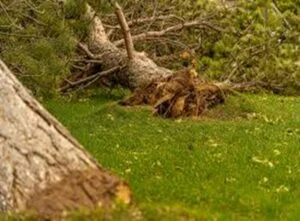
Other Home Systems
Of course, your home has many other infrastructure elements that are not technically part of its plumbing but are closely connected to it. Gas lines, particularly those exposed outside the home if you have an exterior meter, are quite vulnerable to damage by falling debris. When having trees removed following a storm, be sure your technicians know where your gas meter is, as well as any electrical infrastructure. Damaging any of these elements will create entirely new expenses and safety threats to your home!
Even if your roofing and gutters survive the storm intact, they may be compromised and rendered less effective than they were designed to be. When gutters are filled with leaves and sticks blown around by storm winds, they allow subsequent rainwater to fall and pool up at the foundation of your home, creating further erosion, mildew, and moisture damage risks.
Freezing Temperatures
One of the biggest draws to the Charleston area is the fact that our temperatures are relatively warm year-round. While the Upstate and Midlands regions of South Carolina regularly see freezing temperatures and get at least a little snow and ice nearly every winter, here in the Lowcountry those are rare occurrences.
Because of that, most plumbing systems in our region are buried just below the surface rather than several feet down, as is standard in areas with colder winters. An overnight “hard freeze” (about 20 degrees or colder) can freeze the water inside pipes, causing expansion and a huge amount of internal pressure that can crack even the strongest pipes.
Homeowners farther north are often reminded to leave a faucet dripping overnight when there is the possibility for a hard freeze in order to keep water moving inside the pipes. However, here in the deep South those events usually take us by surprise–we only see a hard freeze like that once every few years. When it does happen, though, it is very important to keep the water running a little bit through the freezing temperatures, particularly because the pipes are closer to the cold surface of the ground.
Protect Your Home!
The very best strategy for avoiding weather related damage to your home or business’s plumbing system is fortunately simple. Make it a point to have Rooter-Man of South Carolina pay your property a visit at least once a year to assess the condition of your plumbing and see if there are any slowly growing concerns that should be resolved before severe weather places a sudden heavy strain on it.
In these periodic inspections, our technicians often find that tree roots are dangerously close to pipes or have even begun to puncture the walls, threatening a leak if they are dislodged during a storm. They can also recommend preventive measures if erosion has altered the composition of the soil surrounding your pipes and they need to be better supported to ease the strain on them.
Of course, our plumbers can also clear any clogs that may be building up in your pipes due to normal everyday use, make sure your sewage pipes are not compromised, install a new garbage disposal in your kitchen, and take care of all your other plumbing needs.
Don’t wait until the next big hurricane is on the horizon to think about the structural integrity of your plumbing. By scheduling an inspection when things are quiet, you can avoid a plumbing emergency and all of the resulting damage to your property when wind and heavy rain strike. Rooter-Man of South Carolina serves the entire Greater Charleston region with plumbing expertise and many years of customer satisfaction.





